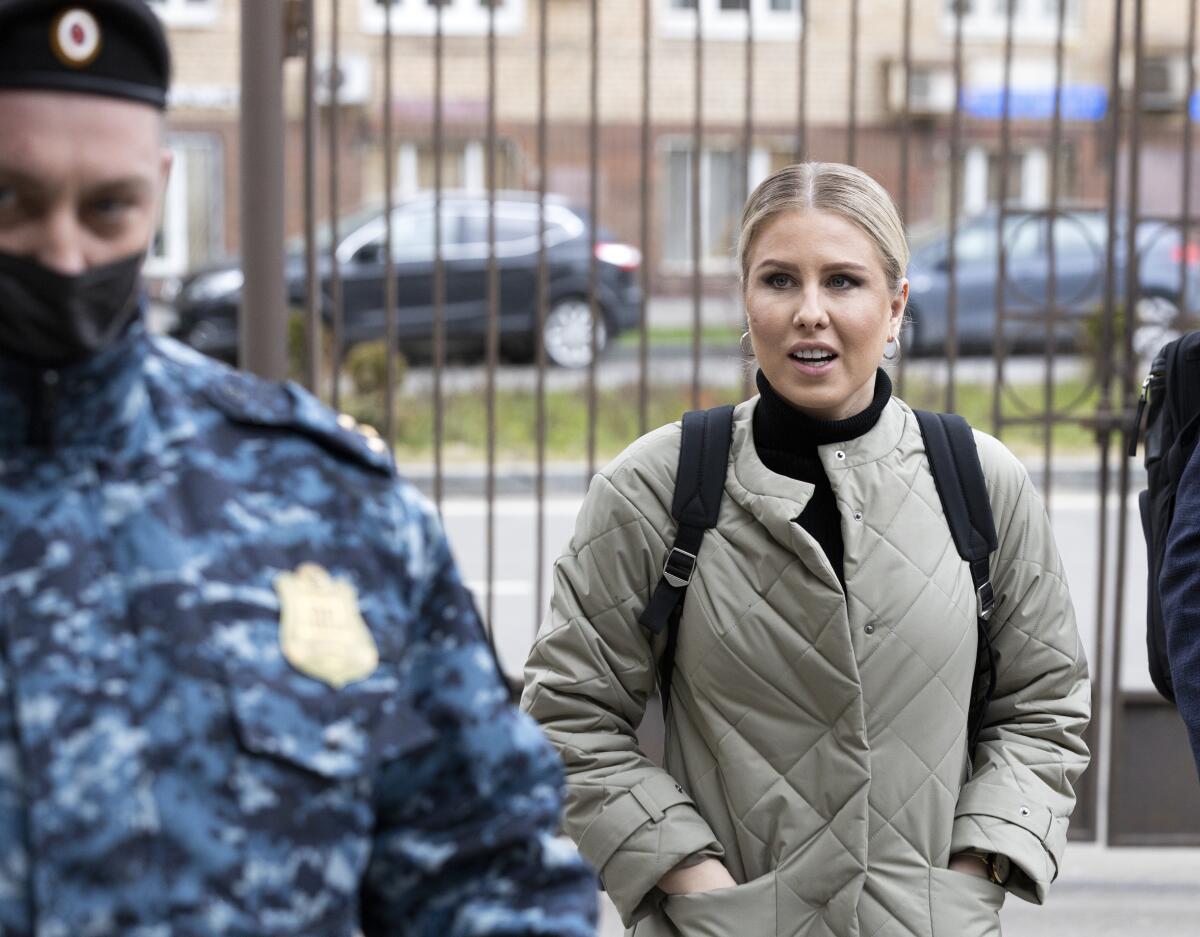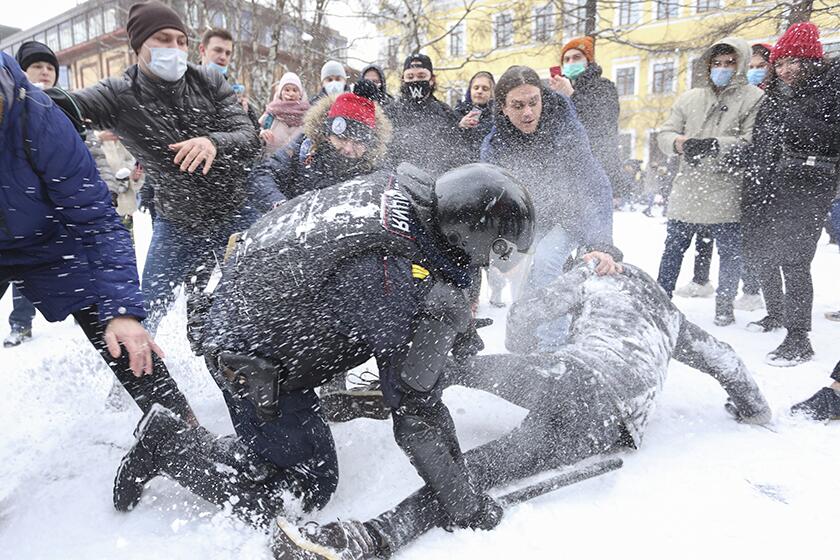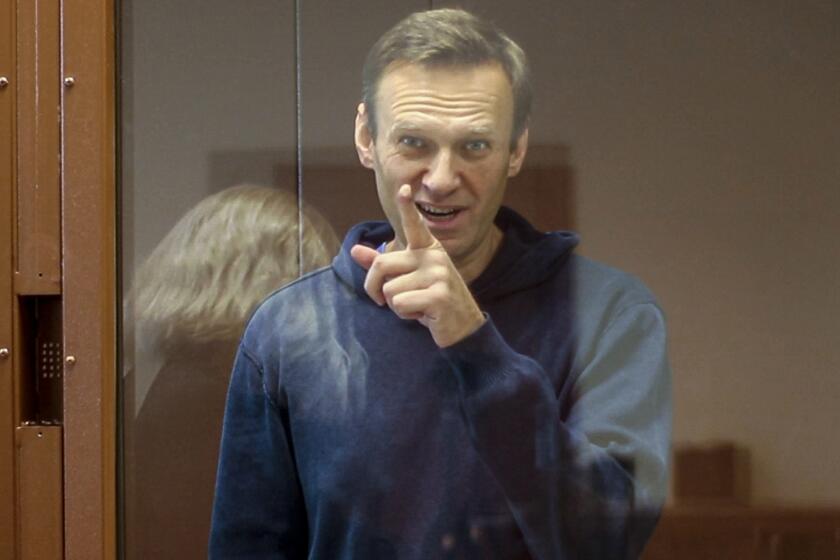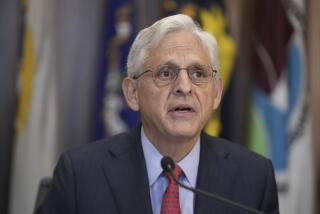In further crackdown on Putin critic, Russia halts operations of Alexei Navalny’s offices

- Share via
MOSCOW — Russian authorities Monday ordered the offices of imprisoned opposition leader Alexei Navalny to suspend activity pending a court ruling on whether his organizations should be outlawed as extremist groups.
The injunction from the Moscow prosecutor’s office was another step in a sweeping crackdown on Navalny, who is President Vladimir Putin’s fiercest critic in Russia — and those with whom he works. The prosecutor’s office petitioned a court earlier this month to label Navalny’s Foundation for Fighting Corruption and network of regional offices as extremist groups.
Such a label would outlaw their activities and expose members and supporters to lengthy prison terms, according to human rights advocates. It is a major challenge for Navalny’s embattled team, with its leader in prison and dozens of its members under arrest, targeted for raids by law enforcement or facing criminal charges.
The prosecutors also asked a Moscow court to restrict the activities of the foundation by banning it from spreading information in the media, taking part in elections, using banks or organizing public events, according to Ivan Pavlov, a lawyer representing the foundation.
The injunction from the prosecutor’s office was posted on social media by Navalny’s allies, who reject the accusations and insist that the actions are politically motivated.
“It’s a total travesty of justice and lawlessness once again in Putin’s Russia,” said top Navalny associate Lyubov Sobol.
Thousands of Russians continue to protest the arrest of Alexei Navalny and their country’s increasingly authoritarian rule.
“They’re just screaming here: We’re scared of your activities, we’re scared of your protests, we’re scared of your Smart Voting,” tweeted Ivan Zhdanov, Navalny’s top ally and director of the Foundation for Fighting Corruption.
The Smart Voting project is designed to support candidates who are most likely to beat those backed by United Russia, the party backed by the Kremlin, in various local elections. That plan was successful in some of last year’s regional balloting.
Navalny’s foundation opened 10 years ago and has since targeted high-ranking Russian officials with exposes on corruption, many in the form of colorful and widely watched YouTube videos. One of the latest postings, which has received 116 million views, alleges that a lavish palace on the Black Sea shore was built for Putin through an elaborate corruption scheme. The Kremlin has denied there are any links to Putin.
Along with the foundation, Navalny set up a vast network of offices in dozens of Russian regions when he was campaigning to run against Putin in the 2018 presidential election. He eventually was barred from running but kept the infrastructure in place.
Imprisoned opposition leader Alexei Navalny says he is ending his hunger strike after being examined by civilian doctors.
Soon, these regional “headquarters” began their own investigations of graft by local officials and recruited activists, some of whom would later run for office. The regional offices also were instrumental in organizing nationwide rallies in support of Navalny this year.
Navalny himself was arrested in January upon his return from Germany, where he had spent five months recovering from a nerve-agent poisoning that he blamed on the Kremlin — accusations that Russian officials reject.
The arrest triggered protests across Russia that proved to be the biggest show of defiance in years. The demonstrations, however, didn’t stop authorities from putting Navalny on trial for violating terms of a suspended sentence stemming from a 2014 embezzlement conviction widely believed to be politically motivated. He was ordered to serve 2½ years in prison and last month was transferred to a penal colony notorious for its harsh conditions.
On Wednesday, another wave of protests in support of Navalny swept across cities in all of the country’s 11 time zones. Unlike in the past, police in many cities didn’t interfere with the demonstrations. But Navalny’s aides in many regions were detained both before and after protests. Over the weekend, several other opposition activists were arrested.
In light of Monday’s injunction, Navalny’s offices posted announcements on social media saying they were suspending their activities. “It’s foolish to get involved in a battle that can’t be won,” Sergei Boiko, head of Navalny’s office in Siberia’s Novosibirsk, wrote on Facebook.
More to Read
Sign up for Essential California
The most important California stories and recommendations in your inbox every morning.
You may occasionally receive promotional content from the Los Angeles Times.















